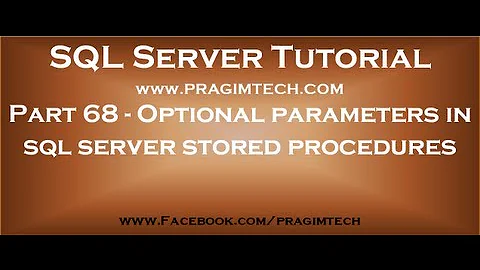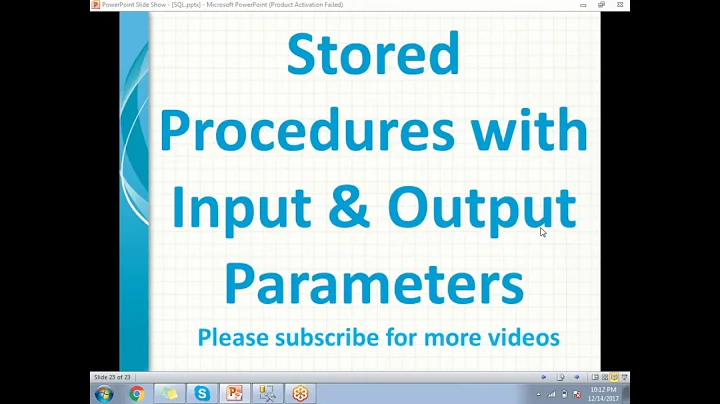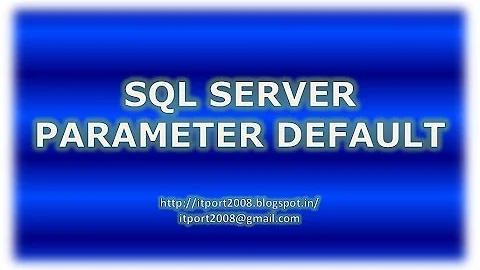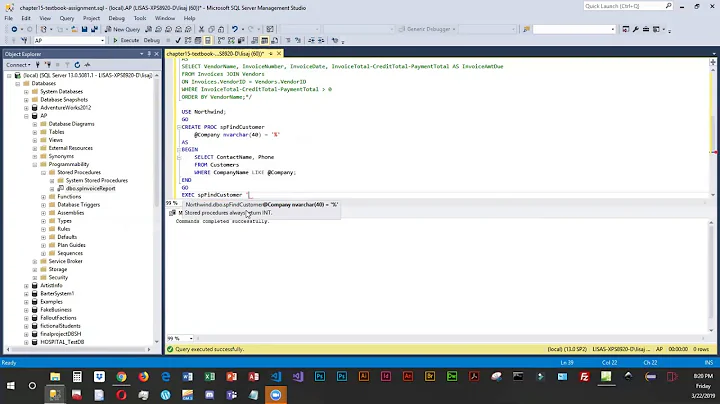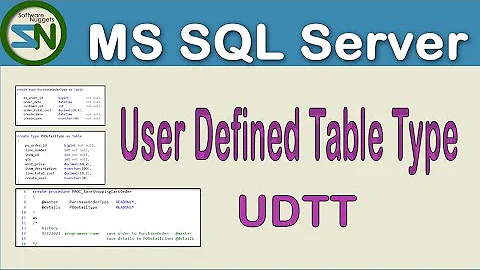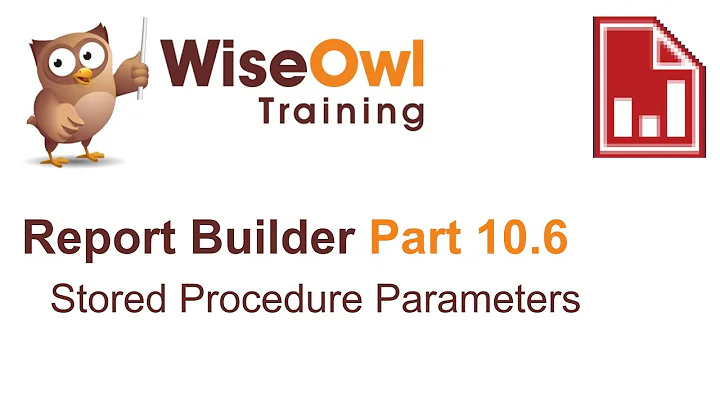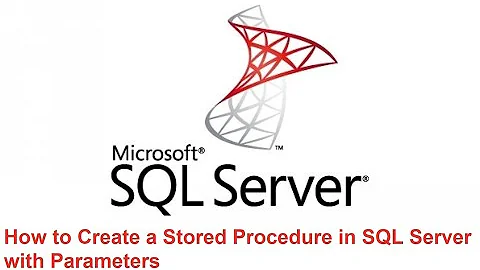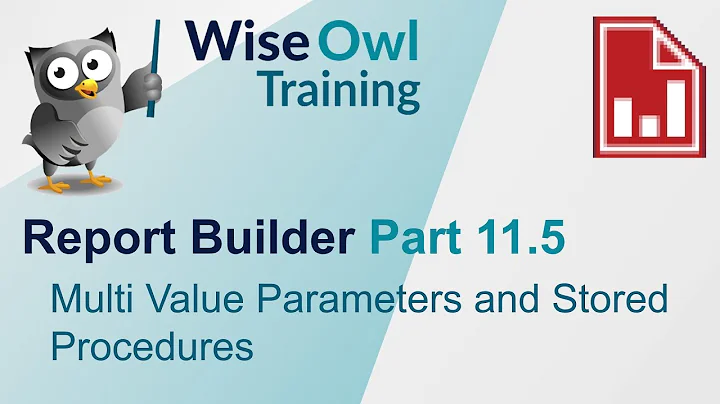SQL Server stored procedure Nullable parameter
Solution 1
It looks like you're passing in Null for every argument except for PropertyValueID and DropDownOptionID, right? I don't think any of your IF statements will fire if only these two values are not-null. In short, I think you have a logic error.
Other than that, I would suggest two things...
First, instead of testing for NULL, use this kind syntax on your if statements (it's safer)...
ELSE IF ISNULL(@UnitValue, 0) != 0 AND ISNULL(@UnitOfMeasureID, 0) = 0
Second, add a meaningful PRINT statement before each UPDATE. That way, when you run the sproc in MSSQL, you can look at the messages and see how far it's actually getting.
Solution 2
You can/should set your parameter to value to DBNull.Value;
if (variable == "")
{
cmd.Parameters.Add("@Param", SqlDbType.VarChar, 500).Value = DBNull.Value;
}
else
{
cmd.Parameters.Add("@Param", SqlDbType.VarChar, 500).Value = variable;
}
Or you can leave your server side set to null and not pass the param at all.
Related videos on Youtube
Shelby115
Currently working at Aunt Millie's Bakeries as a Senior Software Developer with the Microsoft Stack (primarily ASP.NET).
Updated on September 14, 2020Comments
-
 Shelby115 over 3 years
Shelby115 over 3 yearsProblem:
When values are provided to the following script then executed using a setup in C# like below (or in SQL Server environment) the values do not update in the database.Stored procedure:
-- Updates the Value of any type of PropertyValue -- (Type meaining simple Value, UnitValue, or DropDown) CREATE PROCEDURE [dbo].[usp_UpdatePropertyValue] @PropertyValueID int, @Value varchar(max) = NULL, @UnitValue float = NULL, @UnitOfMeasureID int = NULL, @DropDownOptionID int = NULL AS BEGIN -- If the Property has a @Value, Update it. IF @Value IS NOT NULL BEGIN UPDATE [dbo].[PropertyValue] SET Value = @Value WHERE [dbo].[PropertyValue].[ID] = @PropertyValueID END -- Else check if it has a @UnitValue & UnitOfMeasureID ELSE IF @UnitValue IS NOT NULL AND @UnitOfMeasureID IS NOT NULL BEGIN UPDATE [dbo].[UnitValue] SET UnitValue = @UnitValue, UnitOfMeasureID = @UnitOfMeasureID WHERE [dbo].[UnitValue].[PropertyValueID] = @PropertyValueID END -- Else check if it has just a @UnitValue ELSE IF @UnitValue IS NOT NULL AND @UnitOfMeasureID IS NULL BEGIN UPDATE [dbo].[UnitValue] SET UnitValue = @UnitValue WHERE [dbo].[UnitValue].[PropertyValueID] = @PropertyValueID END -- Else check if it has a @DropDownSelection to update. ELSE IF @DropDownOptionID IS NULL BEGIN UPDATE [dbo].[DropDownSelection] SET SelectedOptionID = @DropDownOptionID WHERE [dbo].[DropDownSelection].[PropertyValueID] = @PropertyValueID END ENDWhen I do an execution of this script, like below, it does not update any values.
Example execution:
String QueryString = "EXEC [dbo].[usp_UpdatePropertyValue] @PropertyValueID, @Value, @UnitValue, @UnitOfMeasureID, @DropDownOptionID"; SqlCommand Cmd = new SqlCommand(QueryString, this._DbConn); Cmd.Parameters.Add(new SqlParameter("@PropertyValueID", System.Data.SqlDbType.Int)); Cmd.Parameters.Add(new SqlParameter("@Value", System.Data.SqlDbType.Int)); Cmd.Parameters.Add(new SqlParameter("@UnitValue", System.Data.SqlDbType.Int)); Cmd.Parameters.Add(new SqlParameter("@UnitOfMeasureID", System.Data.SqlDbType.Int)); Cmd.Parameters.Add(new SqlParameter("@DropDownOptionID", System.Data.SqlDbType.Int)); Cmd.Parameters["@PropertyValueID"].Value = Property.Value.ID; // 1 Cmd.Parameters["@Value"].IsNullable = true; Cmd.Parameters["@Value"].Value = DBNull.Value; Cmd.Parameters["@UnitValue"].IsNullable = true; Cmd.Parameters["@UnitValue"].Value = DBNull.Value; Cmd.Parameters["@UnitOfMeasureID"].IsNullable = true; Cmd.Parameters["@UnitOfMeasureID"].Value = DBNull.Value; Cmd.Parameters["@DropDownOptionID"].IsNullable = true; Cmd.Parameters["@DropDownOptionID"].Value = 2; // Current Value in DB: 3Details:
After running an execute (via C# code or SQL Server environment) it does not update
dbo.DropDownSelection.SelectedOptionID. I'm guessing that it might be becausedbo.DropDownSelection.SelectedOptionIDis non-nullable and the parameter I'm using to set it is nullable (despite that when setting it shouldn't ever be null). Upon execution the return value is 0. If I run one of the Updates outside of the procedure they work perfectly, hence my suspicion that it has to do with null-able types.Question(s):
Could this be because the parameters to the stored procedure are nullable and the fields I'm setting aren't?
If not, what could it be?
-
 TTeeple about 10 yearsIf you change those Insert and Updates to Selects, do you return data for the supplied parameters?
TTeeple about 10 yearsIf you change those Insert and Updates to Selects, do you return data for the supplied parameters? -
 Shelby115 about 10 yearsYes. I updated my question, added "If I run one of the Updates outside of the procedure they work perfectly, hence my suspicion that it has to do with null-able types."
Shelby115 about 10 yearsYes. I updated my question, added "If I run one of the Updates outside of the procedure they work perfectly, hence my suspicion that it has to do with null-able types." -
 Shelby115 about 10 years1) I clarified my question a bit. I'm not trying to do output parameter. 2) The stored-procedure says it executes and it returns 0, but the values never update. I'm not sure what you mean by "via sql block".
Shelby115 about 10 years1) I clarified my question a bit. I'm not trying to do output parameter. 2) The stored-procedure says it executes and it returns 0, but the values never update. I'm not sure what you mean by "via sql block". -
 T.S. about 10 yearsDoes your SP executes if you exexut it via sql block? In your case, since you have hardcoded
T.S. about 10 yearsDoes your SP executes if you exexut it via sql block? In your case, since you have hardcodedCmd.Parameters["@Value"].IsNullable = true; Cmd.Parameters["@Value"].Value = DBNull.Value;, you might as well just omit it.
-
-
 Shelby115 about 10 yearsWow, I feel dumb. It should be
Shelby115 about 10 yearsWow, I feel dumb. It should beELSE IF @DropDownOptionID IS NOT NULLlike the rest of them :/ Thank you. -
Kenny Evitt about 9 yearsHow is using
ISNULL(...safer than... IS NULL? It seems like your suggestion is less safe because, for one reason at least, now you have a magic value (zero) that is treated as equivalent toNULL. If you're going to use or allow null values, testing forNULLand onlyNULLis the safest thing to do.
